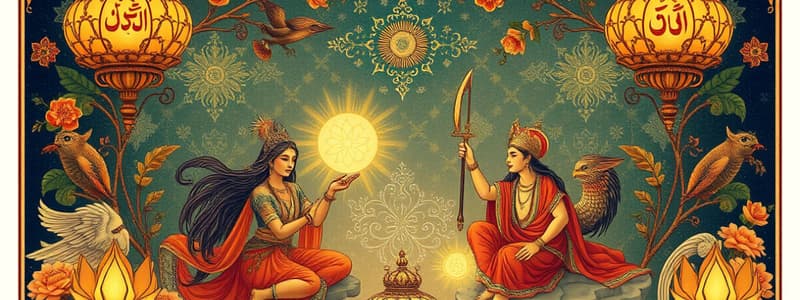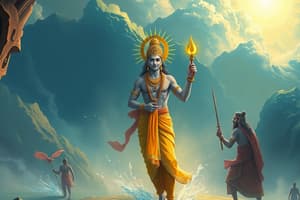Podcast
Questions and Answers
Hinduism was founded around 3000 BCE by a significant historical figure.
Hinduism was founded around 3000 BCE by a significant historical figure.
False (B)
The Upanishads were written around the same time that the Mahabharata was composed.
The Upanishads were written around the same time that the Mahabharata was composed.
False (B)
All revealed religions are considered essentially correct by practitioners of Hinduism.
All revealed religions are considered essentially correct by practitioners of Hinduism.
True (A)
The Bhagavad-Gita is considered a lesser text compared to the Vedas in Hinduism.
The Bhagavad-Gita is considered a lesser text compared to the Vedas in Hinduism.
Hinduism primarily recognizes a single, authoritative text akin to the Bible or the Qur'an.
Hinduism primarily recognizes a single, authoritative text akin to the Bible or the Qur'an.
Hinduism only recognizes a single divine entity and does not celebrate the concept of multiple deities.
Hinduism only recognizes a single divine entity and does not celebrate the concept of multiple deities.
Divali, known as the festival of lights, is celebrated in honor of the goddess of knowledge.
Divali, known as the festival of lights, is celebrated in honor of the goddess of knowledge.
Puji refers to the respectful worship performed by Hindus, often involving rituals conducted at home.
Puji refers to the respectful worship performed by Hindus, often involving rituals conducted at home.
Holi is celebrated in winter and involves rituals that include lighting lamps and burning incense.
Holi is celebrated in winter and involves rituals that include lighting lamps and burning incense.
Prasad is what devotees offer to the gods during worship and is then returned to them as a blessing.
Prasad is what devotees offer to the gods during worship and is then returned to them as a blessing.
Flashcards are hidden until you start studying
Study Notes
Hinduism Overview
- No historical founder; lacks a single authority comparable to major world religions.
- Origin is ambiguous with no fixed date; earliest sacred texts, the Vedas, date back to at least 3000 BCE, possibly as early as 8000-6000 BCE.
- Vedas considered by many as divine and timeless.
Core Beliefs of Hinduism
- Divinity of the Vedas
- Existence of one all-pervasive Supreme Reality
- Cyclical concept of time
- Law of karma (action and consequence)
- Reincarnation belief
- Presence of alternate realities and higher beings
- Role of enlightened masters or gurus
- Emphasis on non-aggression and non-injury
- Recognition of validity in all revealed religions
- Spiritual identity as primary nature of living beings
- Support for an organic social system.
Sacred Texts
- Hinduism lacks a singular authoritative text; instead, there are multiple collections.
- Vedas: Oldest texts with the most authority, likely written between 1800-1200 BCE.
- Upanishads: Philosophical works created between 800-400 BCE, contemporary with early Buddhist teachings.
- Mahabharata: The world's longest epic poem, best known for the Bhagavad-Gita.
- Ramayana: Another significant epic in Hindu literature.
Understanding Deities
- Hinduism embraces a complex view of the divine, integrating monotheism and polytheism.
- Key deities include Vishnu, Shiva, Ganesha, Krishna, Sarasvati, Durga, and Kali.
- Numerous festivals celebrate various gods and seasonal events, with two prominent festivals being Divali and Holi.
Major Festivals
- Divali: Festival of lights, celebrated in October or November for about 4-5 days, honoring Lakshmi, the goddess of wealth. Families engage in rituals at home and temples, filling spaces with light.
- Holi: Spring festival known for vibrant throwing of colored powders, celebrated with enthusiasm over several days.
Worship Practices
- No standard weekly worship service; worship can occur privately at home shrines.
- Puja: Central act of worship, involving respect, homage, and rituals to deities, both at home and in temples.
- Home altars feature representations of deities; daily offerings are common.
- Temple rituals are more elaborate, conducted by priests with the return of offerings as prasad (blessings) to devotees.
- Worship engages all five senses to honor the divine presence.
Studying That Suits You
Use AI to generate personalized quizzes and flashcards to suit your learning preferences.




